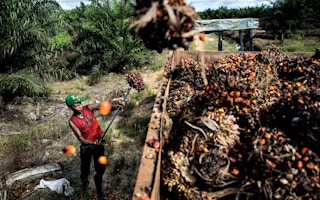Singapore’s worst environmental crisis in a decade, with the island being enveloped by haze from Indonesian forest fires in June, did not quite spark an international incident. But it certainly caused some diplomatic strain.
To continue reading, subscribe to Eco‑Business.
There's something for everyone. We offer a range of subscription plans.
- Access our stories and receive our Insights Weekly newsletter with the free EB Member plan.
- Unlock unlimited access to our content and archive with EB Circle.
- Publish your content with EB Premium.
Singapore reacted with alarm as the Pollution Standards Index hit 401 which, under Singapore Government guidelines, may be life-threatening. While Indonesia marshalled helicopters and cloud seeding equipment, the Indonesian President’s Office confirmed that the haze was caused by palm oil companies – some of which happen to be controlled by Singaporean and Malaysian interests.
While the diplomatic tiff continued, the Indonesian Government was gearing up to put the heat on Indonesia’s plantation monopolies, many of which are under foreign interests.
Early in April, Indonesia’s Ministry of Agriculture (MOA) announced a plan that plantations for a ‘group of companies’ will be limited to: 20,000 ha in one province; and 100,000 ha nationally.
The MOA predicted that the regulation would be in place by the end of April. Not a lot more was heard on this, until the MOA called a meeting of plantation interests in mid-June, at which the draft regulation was circulated.
This would be the first recent attempt by the Indonesian Government to regulate groups of companies in the powerful plantation industry, and to tackle the plantation monopoly issue in Indonesia. Holdings of individual companies, but not group companies, were previously regulated, resulting in parent companies incorporating numerous subsidiaries to hold individual plantation concessions. A 2002 regulation did try to restrict plantation holdings for a corporate group – with a much narrower definition than under the current MOA proposal – although this was abandoned six years ago.
For decades, Indonesia has been a haven for foreign companies in the palm oil plantation industry. As opposed to mining, where foreigners have recently been increasingly required to divest up to 51 per cent to Indonesian interests, under Indonesian law foreigners can still hold up to 95 per cent in a plantation company, provided that the company’s activities are not limited to processing only.
The Indonesian palm oil plantation industry has developed rapidly, more than doubling in size to nearly 20 million tons between 2000 and 2010. The majority of the palm oil industry is concentrated in Kalimantan and Sumatera, with the rest spread throughout Indonesia, including concentrations in Sulawesi and Papua. It is estimated that Indonesia’s plantations currently cover eight million hectares, and are projected to reach 13 million hectares by 2020, and will be spread over a larger number of owners, if the MOA has its way.
Under the MOA’s proposal, the concept of a ‘group of companies’ will be defined broadly as two or more companies having related management or part of their shares owned in common either directly or indirectly, allowing control of the management or operation of the plantation companies. In other words, this will capture plantations held by any entity up the corporate tree.
“
As is usual in Indonesia, no regulation should be retroactive. In other words, the MOA’s proposal should not affect existing monopolies, only prevent them from expanding further. Predictably, this has resulted in a rush to complete existing transactions before the regulation comes into effect.
The proposal by the MOA is that listed companies will be exempt from the anti-monopoly provisions, provided that a majority of their shares are publicly owned. There are at least 15 plantation companies listed on the Indonesia Stock Exchange (IDX).
Local interest groups have claimed that the proposed exemption is absurd because listed IDX companies rank as the worst offenders in terms of plantation monopolies. They also claim that consultation on the proposal has been limited to the “big players”, with no input from the plantation industry in general.
The process of licensing for plantation companies in Indonesia is complicated, involving approvals at the regency, provincial and national level. A company must first apply for a Location Permit, being a right to negotiate land acquisitions with local land owners, then a Plantation Business Licence (IUP), and finally for the relevant land to be registered as Right of Cultivation (HGU). The process can take several years to complete, often longer.
Relations between plantation owners and the local community have always been touchy in Indonesia. While the foreign shareholder limitation in plantation companies has been limited to 95 per cent for some time, plantation owners are under a so-called plasma obligation to effectively give the local community a 20 per cent benefit of the plantation.
The MOA’s proposal will increase the benefits of plantations for local communities. Holders of IUPs for processing only, rather than plantations, will be required to undertake phased divestment of shares to a plantation cooperative, commencing with a five per cent divestment in the fifth year of commercial production, rising to 51 per cent by the tenth year. The concept of divestment in the context of mining applies only to foreign-controlled companies. If MOA’s proposal materialises, divestment of processing plants would apply to both foreign-controlled and local plantation companies. This is consistent with recent court decisions in the mining space, which are favouring local communities over big business.
In terms of timing, the MOA proposes that a plantation company must complete all land acquisitions, and obtain HGU registration, within two years of obtaining an IUP. The industry has criticised this as being unrealistic, given the protracted process of obtaining HGU – and assumes that the entire area of an IUP will be subject to one application for HGU only, which is often not the case. Issues of overlap with third party concessions, which must be resolved before the HGU can be issued, often result in the area subject to an IUP being split into different parcels and subject to separate HGU applications, with the clean area application being submitted first and the overlap area being submitted after the overlap issue has been resolved. It is currently unclear as to where these split applications will stand. This also raises concerns as to whether plantation owners who hold slightly dated IUPs, if the regulation comes into effect, will be able to meet the two-year timeframe.
The proposal also gives a company just two years after receiving its IUP to complete its land acquisitions and obtain certificated plantation land title (i.e. HGU). So, it may still impact upon plantation companies that already have IUPs but are unable to meet the two-year timeframe.
As is usual in Indonesia, no regulation should be retroactive. In other words, the MOA’s proposal should not affect existing monopolies, only prevent them from expanding further. Predictably, this has resulted in a rush to complete existing transactions before the regulation comes into effect. While the MOA is very optimistic, it remains unclear when (or if) this regulation will come into effect.
The MOA is not the only party focused on preventing further expansion of monopolies in Indonesia. Indonesia’s Business Competition Supervisory Commission (KPPU) introduced new rules in 2010 that require merger clearance from KPPU where the merging parties’ combined asset value exceeded IDR2.5 trillion, or combined sales exceeded IDR5 trillion, during the previous financial year. There are currently 40 mergers sitting before KPPU, with at least four related to plantations companies. Mergers in Indonesia, where offshore parents are involved, may also trigger requirements for notification to, or sometimes approval from, competition authorities in other countries.
At the international level, the diplomatic tiff between Singapore and Indonesia raged mid-June, with Indonesian Government officials accusing Singapore of being “childish” and “in a tizzy”. Ultimately, however, at the end of June, in order to ease tensions, Indonesian President Susilo Bambang Yudhoyono apologised to both Singapore and Malaysia, asking for their understanding.
While Singapore and Indonesia have made up, the local and international plantation community remains jittery about the MOA’s proposal – particularly the big players who plan to get bigger.
Rick Beckmann is a partner at Norton Rose Fulbright Australia who works at the Indonesian associate office of Susandarini & Partners. Aldi Rakhmatillah is an associate at Susandarini & Partners with substantial experience in assisting foreign and Indonesian clients in respect of plantation acquisitions and operations.











